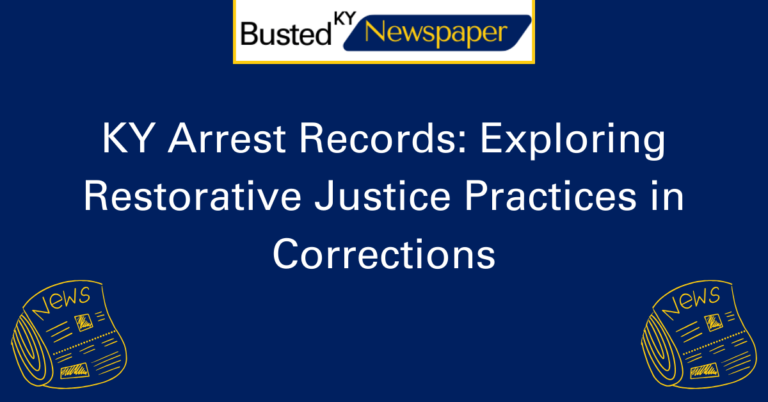KY Mugshot Websites: Balancing Anonymity and Public Safety
When it comes to the internet, anonymity and privacy have become hot topics of discussion. With the rise of social media and online platforms, individuals are constantly grappling with the question of how much of their personal lives should be shared with the public. This dilemma becomes even more complex when it comes to mugshot websites.
Mugshot websites, like KY Mugshot Websites, have gained popularity in recent years, providing access to publicly available arrest records and booking photographs. On one hand, these websites serve as a valuable resource for individuals who want to stay informed about the criminal activities happening in their community. On the other hand, they raise concerns about privacy and the potential for reputational damage.
In this Comprehensive Guide, we will explore the delicate balance between anonymity and public safety when it comes to mugshot websites. We will delve into the ethical implications of these platforms, the legal framework surrounding their operation, and the potential consequences for individuals whose mugshots are featured. By shedding light on this controversial topic, we aim to inform and engage readers, regardless of their familiarity with the subject matter.
Ethical Implications of Mugshot Websites
Mugshot websites have ignited a fierce debate surrounding ethics and personal privacy. While some argue that these platforms serve as a valuable tool for public safety, others raise concerns about the potential for reputational damage and the violation of individual’s privacy rights.
The Legal Framework Surrounding Mugshot Websites
The operation of mugshot websites is a complex legal issue. While the First Amendment protects the right to publish public information, such as arrest records, there are legal nuances that come into play. For example, some states have enacted legislation to regulate the removal of mugshots from these websites, requiring individuals to pay a fee for their removal.
The Consequences for Individuals Featured on Mugshot Websites
Being featured on a mugshot website can have far-reaching consequences for individuals, impacting their personal and professional lives. It can lead to reputational damage, making it more difficult to find employment or secure housing. Additionally, these websites often rank highly in search engine results, making the information easily accessible to anyone conducting a simple online search.
The Role of Anonymity in Public Safety
One aspect of the mugshot website debate is the role of anonymity in public safety. Proponents argue that these websites provide transparency and empower individuals to stay informed about criminal activities in their community. They argue that removing or limiting access to mugshots may hinder public safety efforts and compromise the right to information.
The Delicate Balance Between Anonymity and Privacy
Striking a balance between anonymity and privacy is a challenging task. While mugshot websites can contribute to public safety, it is crucial to address the potential harm that can be caused to individuals featured on these platforms. Finding a solution that respects both the right to privacy and the need for transparency is imperative.
The Need for Further Examination and Regulation
Mugshot websites continue to raise important questions about privacy, ethics, and the limits of public information. As technology advances and these platforms evolve, it is necessary to engage in ongoing discussions and enact regulations that protect individuals’ privacy rights while still promoting public safety.
FAQ’s
What are mugshot websites?
Mugshot websites are online platforms that display individuals’ booking photographs and arrest records, sourced from public records and law enforcement agencies. These websites make mugshots easily accessible to the public, providing frontal and profile views of individuals at the time of their arrest.
Why have mugshot websites gained popularity?
The popularity of mugshot websites stems from the internet’s growth, making information widely available. Public curiosity about legal matters, the desire for transparency in law enforcement, and the emergence of online reputation management services contribute to the demand for accessing and sharing mugshots.
What concerns do mugshot websites raise?
Mugshot websites raise concerns about privacy, reputational harm, and potential misuse of information. Individuals may face damage to their reputation even if charges were dropped, questioning the fairness of associating them with criminal activity based solely on an arrest record. The accessibility of this information raises worries about harassment, discrimination, and the perpetuation of negative stereotypes.
What is the ethical implication of mugshot websites?
What is the legal framework surrounding mugshot websites?
The legal framework surrounding mugshot websites is complex and varies across jurisdictions. In the United States, for instance, the First Amendment protects the freedom of speech and the press, making it challenging to regulate the publication of public records. However, privacy concerns have led some states to enact legislation addressing the removal of mugshots from these websites. Some argue that such legislation strikes a balance between the right to information and an individual’s right to privacy.
Conclusion
Mugshot websites present a complex and controversial issue that requires careful consideration. While they can provide valuable information for public safety, the potential harm to individuals’ reputations and privacy cannot be ignored. Balancing these concerns is crucial, and ongoing examination and regulation are necessary to ensure the ethical operation of mugshot websites.







